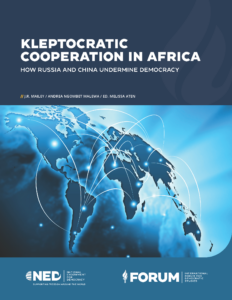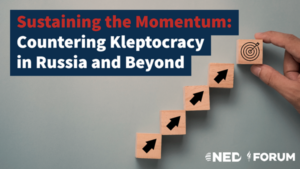 Russia and China provide surge capacity to Africa’s kleptocratic networks, says a new report from the National Endowment for Democracy (NED).
Russia and China provide surge capacity to Africa’s kleptocratic networks, says a new report from the National Endowment for Democracy (NED).
Russia’s full-scale invasion of Ukraine in 2022 showcased the grave national security threat that kleptocracy poses to democracy. The bizarre short-lived mutiny by Yevgeny Prigozhin’s Wagner Group put a spotlight on one of the shadowy global tentacles of Russia’s influence, notes the report, Kleptocratic Cooperation in Africa: How Russia and China Undermine Democracy,” from NED’s International Forum for Democratic Studies. At a time when Moscow is increasingly isolated diplomatically and economically, the Wagner Group’s corrosive commercial interests and cozy relationships in parts of Africa with some of the continent’s most diplomatically isolated regimes reveal the extent to which a global kleptocratic support network has taken shape.
In his essay, “Criminal States, Militarized Criminals, and Profiteers: Russia, Africa, and the Evolving Ecosystem of Transnational Kleptocracy,” J.R. Mailey zeroes in on the fact that the Wagner Group’s support to African kleptocrats has little to do with providing security and stability. Rather it is focused on extracting resources, advancing geopolitical goals, and serving as a cog in the authoritarian mutual support machinery. The opaque economic relationships that the Wagner Group has developed on the continent are too lucrative for the Kremlin to surrender.
 Chinese-linked networks are helping to embolden and empower local kleptocrats seeking to enrich themselves at the expense of their populations. Andrea Ngombet Malewa’s essay, “How China Fuels African Kleptocratic Networks: The Case of Congo-Brazzaville,” highlights the establishment of a Sino-Congolese Bank for Africa that could allow kleptocrats to bypass the transparency requirements of Western-linked banks, affording opportunities to launder money with impunity. This development has significant implications for accountability norms worldwide.
Chinese-linked networks are helping to embolden and empower local kleptocrats seeking to enrich themselves at the expense of their populations. Andrea Ngombet Malewa’s essay, “How China Fuels African Kleptocratic Networks: The Case of Congo-Brazzaville,” highlights the establishment of a Sino-Congolese Bank for Africa that could allow kleptocrats to bypass the transparency requirements of Western-linked banks, affording opportunities to launder money with impunity. This development has significant implications for accountability norms worldwide.
Civil society and independent media seeking to identify and expose kleptocratic networks in Africa often lack the resources, specialized knowledge, and skills needed to track illicit financial flows, and the complex vehicles kleptocrats use to move money around the world. Resource-rich regimes in countries such as Congo-Brazzaville, Sudan, and the Central African Republic already suffer from gaping deficits in accountability and transparency. Despite these odds, both authors identify critical steps to elevate civil society’s essential work exposing and combatting kleptocracy in these circumstances:
- Given the knowledge deficits about Russian and Chinese activities in kleptocratic networks, non-governmental organizations should focus on educating the public on the true nature of Russian and Chinese activities in their countries, as well as on the financial, social, and ecological costs of initiatives pushed by Beijing and Moscow;
- Leading authoritarian regimes, China and Russia first among them, rely on lucratively financed media enterprises to distort and manipulate information about their own activities. Accordingly, civil society should challenge authoritarian narratives, for instance those that use long-standing anti-colonial rhetoric to justify their corrupting activities and support for kleptocratic networks;
- Since the threat corrosive kleptocratic networks pose is inherently transnational, there should be concerted efforts to bring often-isolated civil society activists and journalists across regions together and to encourage collaboration and cross-border learning;
- Civil society organizations should meticulously document the activities of authoritarian actors in their countries, with the hope that this information could later be used to hold perpetrators accountable for their actions.







